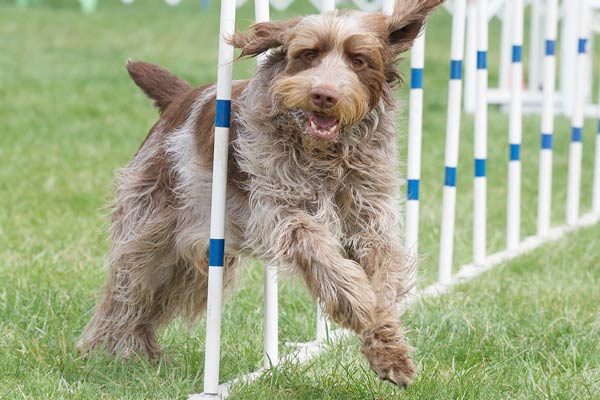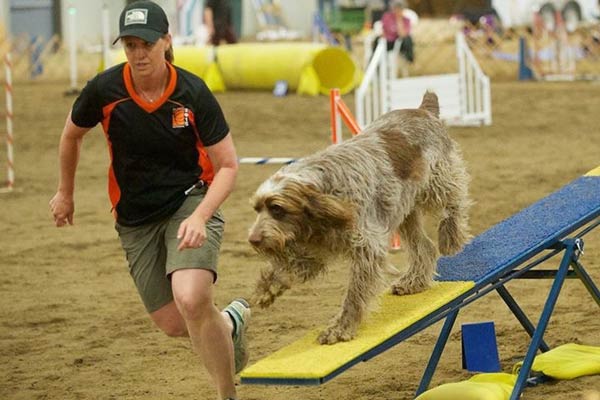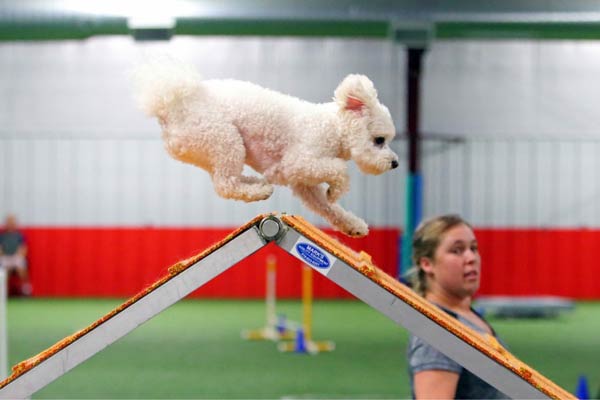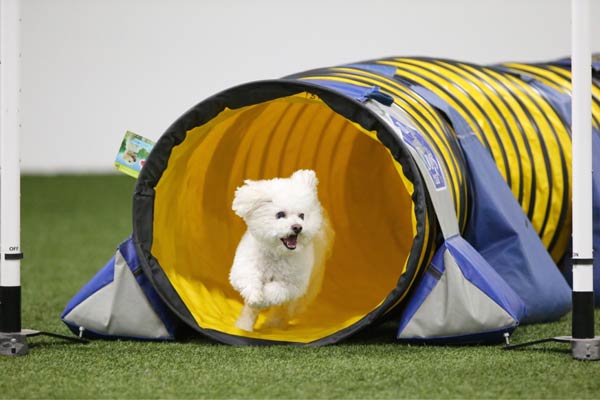
At first glance, Razzberry the Bichon Frise and Henry the Spinone Italiano don’t appear to have much in common: Razzberry is a toaster-sized ball of snowy white hair with an unnatural hostility to leather footwear. Laidback Henry, by contrast, looks like the famous big dog Benji and swoons at the sight of beef jerky or pigeons.
But what these two canine athletes do share is a passion for the obstacle-racing, jump-vaulting sport of agility (for those who aren’t familiar, agility is a dog sport where handlers direct their dogs through a pre-set obstacle course within a certain time limit.) And later this month, both will be heading to Reno, Nevada, as first-time competitors in the 2018 AKC National Agility Championship.
Not all agility trials are born equal, and the AKC Agility National Championship, held this year from March 23 to 25 at the Reno‐Sparks Livestock Event Center, is among the most prestigious in the country (check out agility stats compiled from the 750 exhibitors competing in the 2018 event).
“When you have a relatively rare breed like the Spinone, it’s much, much harder to qualify for Nationals,” says Stacie Roberts of Pocatello, Idaho, who owns and handles 6-year-old Henry, a scraggly-coated Italian hunting dog who Roberts says is usually mistaken for an Otterhound.

Photo: Gaines Photography
At the Agility Invitational, AKC’s other premier agility event held each December in Orlando, the top five agility dogs of each breed are invited to compete. But at the Nationals, Roberts notes, dogs qualify on their record regardless of breed. “So when you look at the list of competitors, you’ll see three solid pages of Border Collies” – the fastest and most competitive agility breed, and the one for which the sport was designed – “and maybe one Spinone somewhere. For us, qualifying to compete was a really big accomplishment.”
Henry – one of just a handful of Spinoni to successfully compete in agility at the Masters level – is only the third of his breed to compete at the Nationals. But no matter what the venue, running a Spinone can be a challenge, Roberts concedes.
“Spinoni are easy to train, but they can be quite stubborn,” Roberts says. Henry’s affability can sometimes inspire the occasional “Spinone moment”: “Sometimes he’ll just go and visit the judge – he wants to know what they’re looking at,” she explains. In his years of competition, Henry has learned to tune out most distractions, except for the time a flock of pigeons flew by while he was in the ring – a provocation no bird dog worth his salt could pass up.

Photo: Gaines Photography
Size can also be an issue: The Spinone’s naturally big stride makes hitting the contacts on obstacles such as the dog walk more difficult. In a concession to Henry’s 85-pound frame, Roberts runs him at in the Preferred class, which uses modified, lower jump heights. And because the breed was designed to hunt hard in the morning and then recoup energy during the day, “they can get tired more easily than some other breeds,” requiring hotel timeouts between runs so Henry can recharge.
That level of competition may seem impossibly intimidating. But Sari Bankson of Fort Gratiot, Michigan, who owns and handles Razzberry the Bichon, says it’s nothing short of exhilarating.
Seven-year-old Razzberry – Bankson is a foodie, in case you haven’t guessed – started competing in agility when she was just over a year old. A bit intimidated by what she heard was the intensity of AKC trials, Bankson instead entered events sponsored by other agility organizations. But a couple of years ago, after the “minor leagues,” as the calls them, no longer provided a challenge, Bankson entered her first AKC trial. And she was pleasantly surprised at just how welcoming the “major leagues” could be.

Photo: Rick Fleming
“I liked the challenge of the AKC courses compared to what I was used to, and I liked the support from the audience and the other agility people,” Bankson says. “I would have people I didn’t even know coming up to me saying, ‘Hey, good run!’”
After achieving her MACH title in November and ranking as the AKC’s #4 Bichon Frise last year in just under seven months, Razzberry went to compete at the AKC Agility Invitational this December as well as last month’s Westminster Kennel Club’s Masters Agility competition.
Like any star athlete, Razzberry does have her quirks. “She’s terrified of things that are made of wildlife, like boots lined with rabbit fur or leather gloves,” Bankson explains.
The solution? Razzberry sits on a chair ringside while waiting her turn to compete: Being elevated helps keep her calm.

Photo: Rick Fleming
In Reno, the biggest challenge will be a cosmetic one: The climate-controlled horse arena has a packed-dirt floor, and by the end, Razzberry will likely be “red or orange or brown or whatever color the dirt is,” Bankson says cheerfully.
In the end, she thinks, it’s a small price to pay for an activity she and her dog love so much. When Razzberry and Henry arrive at the AKC National Agility Championship in Reno later this month, their presence wordlessly will broadcast the same message: Agility is a gloriously addictive sport. And if you train hard enough, and your bond with your four-legged partner is strong enough, you can get to the top, too.
More about the AKC National Agility Championship:
The 2018 AKC National Agility Championship takes place Friday, Saturday, and Sunday, March 23-25, 2018, in Reno, Nevada. The event will be held at the Reno-Sparks Livestock Event Center and is FREE for the general public to attend. For more details, click here, and tune in to AKC.TV or our Facebook page on Sunday, March 25, 2018, to watch the livestream of the AKC 2018 National Agility Championship finals beginning at 8 p.m. EST.
Header photo: Sari Bankson/Gaines Photography

